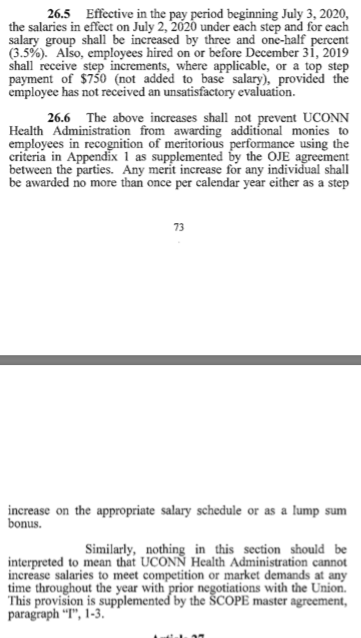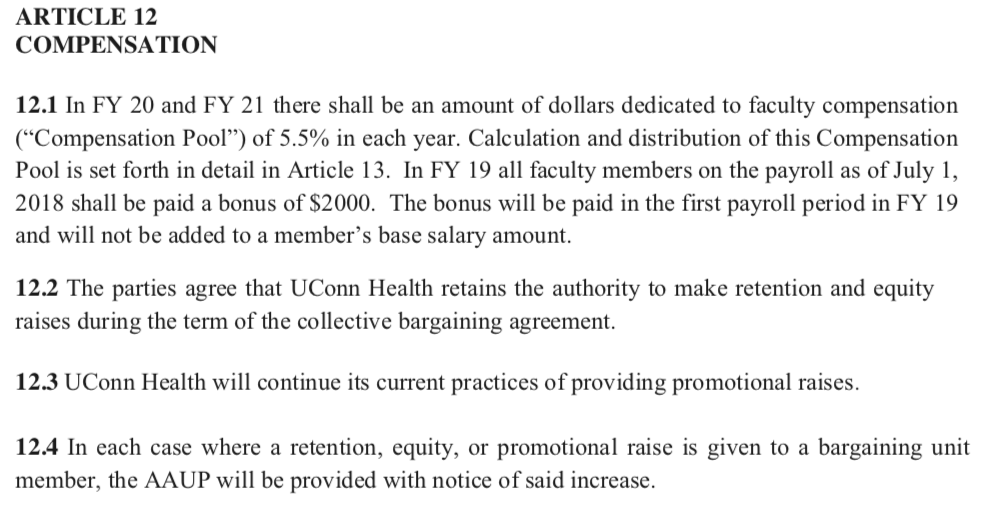A provision in the contract between UConn Health and the University Health Professionals bargaining unit allows UConn Health to raise employee salaries or issue bonuses in order to “meet competition or market demands at any time throughout the year,” according to the collective bargaining agreement.
This contract provision was used by UConn Health to provide $1.5 million in retention bonuses for certain nursing staff between February of 2018 and June of 2019, according to a newly-released state audit.
Those retention bonuses came alongside a $2,000 bonus in 2018, followed by two 3.5 percent wage increases in 2019 and 2020, plus step increases generally valued at 2 percent of pay.

The wage and step increases were part of the 2017 SEBAC Agreement negotiated by Gov. Dannel Malloy and the State Employee Bargaining Agent Coalition.
The final wage increase for unionized state employees came on July 1, 2020. The next step increase for employees takes effect in January of 2021.
State auditors cited UConn Health for not getting approval from the Board of Trustees before issuing the $1.5 million in bonuses.
UConn Health said it doesn’t need board oversight because the ability to issue bonuses and raise salaries is included in the union contract, which was approved by the board.
But the ability to issue retention bonuses and raises for UConn Health employees is not limited to the University Health Professionals bargaining group. UConn Health Professors – some of the state’s highest paid employees – have the same contract provision.
The auditors cited clinical incentive payments to faculty members in UConn Health’s School of Dental Medicine that appear significant.
The auditors cited 6 incentive payments that totaled $468,395, roughly working out to $78,000 per faculty members who participate in the dental faculty practice plan. There are 22 participating faculty members, according to UConn Health’s response, although it’s not known if they all received incentive payments.
The contract provisions allow for increases in the salary schedule of employees or lump sum bonuses in order for UConn Health remain competitive. The bonuses or salary increases can also be based on merit and are limited to one per year.

UConn Health also defended the bonuses by citing the SCOPE Agreement of the contract, which outlines what constitutes “merit” for bonuses or wage increases.
According to the agreement, funds for these payments were provided under “Funds for Elimination of Wage Inequities in State Service,” which says, “the General Assembly shall appropriate sufficient funds to the reserve for salary adjustments account in the annual appropriations act,” in order to modify compensation plans.
As constituent unions in SEBAC, the contracts for both the University Health Professionals and the UConn Health Center chapter of the American Association of University Professors, were approved by the General Assembly in 2017, as part of the 2017 SEBAC Agreement.
The audit also showed UConn Health paid out excessive compensation for compensatory time, administrative leave and long-term disability insurance in 2017 and 2018.
According to auditors, the university healthcare system paid compensatory time to managers totaling $363,979 over three years, even though neither state policy did not allow for lump sum payouts.
Auditors also found the university health system is providing long-term disability insurance to employees who already receive coverage under State Employee Retirement System.
“Our review of state bargaining unit contracts and comparison to with other state universities identified that only a very small segment of state university and board of regents’ employees received long-term disability insurance coverage,” the auditors wrote. “Conversely, UConn Health paid for long-term disability insurance for approximately 61% of its workforce.”
The cost of the long-term disability coverage amounted to nearly $880,000 per year. UConn Health said it would review disability coverage in its collective bargaining agreements “in anticipation of negotiations with both bargaining units in 2021.”
UConn Health also paid out $503,438 in paid administrative leave, largely related to an investigation of 6 employees. Only one of those employees was discharged from service.
But those bonuses and incentive payments may be difficult to come by this year, as UConn Health faces large deficits and a massive loss of revenue due to the COVID-19 pandemic.
UConn Health is facing an estimated $114 million deficit and will likely run out of cash by August. The health system is faced with cutting expenses and accelerating block grants to make up for the difference, according to its presentation to the UConn Board of Trustees.
Salaries, wages and fringe benefits are projected to make up nearly 61 percent of UConn Health’s expenses, totaling $785 million.
UConn Health receives roughly 22 percent of its revenue from the state, totaling $275 million per year, which includes grants to offset the cost of the state’s unfunded pension liabilities.


douglas willour
July 10, 2020 @ 4:51 pm
Of course not mentioned by anyone is that the generous increases in 2019 and 2020 are a result of three years of 0’s.
Thad Stewart
July 18, 2020 @ 1:09 pm
Show me anywhere in the private sector where raises are guaranteed? This is precisely why healthcare is never going to be affordable for the majority of US citizens. I am all for decent salaries for top docs, but this ludicrous gubment scale does not work when people don’t work.
Mark Scott
July 13, 2020 @ 2:03 pm
They will tax the underpaid, under-insured, private sector workers who have no job security or pensions. The very people who are getting slammed by the virus. Those of us who live by the sword and sadly, die by the covid.
The state workers who have not found their place yet on a Florida beach will continue to shake us down until there no-longer is a private sector to pay their outrageous salaries and pensions, Terrible!
Brian Garceau
August 19, 2020 @ 9:05 pm
600,000 private sector employees in Connecticut lost their jobs as a result of the pandemic and not only did ZERO state employees lose their jobs but they received 5.5% raises!! I guess that’s Lamont’s idea of “Shared Sacrifice “.